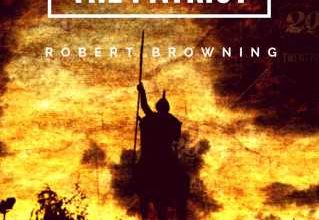Hearth Lesson by Paula Meehan is an exploration of a dysfunctional family through the use of certain mythical characters existing in the current times. Paula Meehan navigates the distressing side of a family by employing the most dysfunctional of families, especially couples, Zeus and Hera from Greek mythology. This poem exists at an intersection of class, gender, family unit, childhood, and environment, encroaching on the socio-economic and cultural issues plaguing families.
Hearth Lesson by | Summary and Analysis
Either phrase will bring it back –
money to burn, burning a hole in your pocket.
I am crouched by the fire
in the flat in Seán MacDermott Street
while Zeus and Hera battle it out:
The narrator here seems to be a child or a family member reflecting on the memories of a time when there was a “battle” going on in the house. These memories, by the way, they are being talked about, present themselves as traumatic on certain levels. The phrases that seem to trigger these memories are intrinsically linked with money and financial matters.
The poet sets this poem in Dublin, Ireland, to situate the issue of the poem within that space. This makes this poem rooted within the local situation instead of trying to apply it universally. The street, at the time this poem was being written, was an area plagued with poverty and crime. The poet is attempting to situate the background of the couple’s fight and the reader can make conjecture what the fight is about. Zeus and Hera are battling it out, fighting as a couple, and this inserts the universal element that balances out the locality. They seem to be the run-of-the-mill representation of a fighting couple. The fire the narrator is sitting in front of seems to be entirely useless in providing any warmth.
for his every thunderbolt
she had the killing glance;
she’ll see his fancyman
and raise him the Cosmo Snooker Hall;
he’ll see her ‘the only way you get any
attention around here is if you neigh’;
he’ll raise her airs and graces
or the mental state of her siblings,
every last one of them.
This verse sets the tone of the fight that is raging on, which in itself is founded on the rules of gambling. In gambling, one uses the phrase “I’ll see you and raise you” to accept the bet that is presented and raise the stakes by placing one yourself. In a general context, it is used to reveal something of greater and graver significance than the one the other person just revealed. Here, in a metaphorical battle of gambling, Zeus and Hera are insulting and attacking each other verbally, they are trying to humiliate the other person in a supposedly financial battle. They are gambling away their relationship little by little, chipping at their stores of positive emotions.
In this verse, thunderbolts might even refer to domestic abuse and Hera’s return of threats. Hera is insulting the improper and false gentlemanly behaviour of Zeus by comparing him to the big snooker hall in Dublin, who, in turn, criticises her unstable family members and broken family.
I’m net, umpire, and court; most balls
are lobbed over my head.
Even then I can judge it’s better
than brooding and silence and the particular hell
of the unsaid,
or ‘tell your mother…’ ‘ask your father…’.
Even then I can tell it was money
the lack of it day after day,
at the root of bitter words
but nothing prepared us one teatime
when she handed up his wages.
The narrator is disclosing that they are the centrepiece of this fight, the person over whom this fight continues day after day. There seems to be resentment building towards this, but also a certain bargaining is being done by the narrator. They confess that this is better than the purgatory of silence and the silent rumination of this tension. Worse, the narrator has also been sometimes assigned to the role of the ball kid, just to pass on the terrible remarks the couple might make to each other. The narrator understands that the root cause of this fight is money, especially the lack of it in the household.
The “bitter words” that the couple shared are mainly about the financial situation of the house. The narrator refers to “us” which implies the presence of more than one family member. They are all dumbfounded when Hera hands over all of Zeus’ wages to him. There seems to be an implication of rejection of Zeus by the family. The children (most probable assumption) are taken aback as this seems to herald a new time in the house.
She straightened up each rumpled pound note, then
a weariness come suddenly over her,
she threw the lot in the fire.
The flames were blue and pink and green,
a marvellous sight, an alchemical scene.
‘It’s not enough,’ she stated simply.
And we all knew it wasn’t.
The flames sheered from cinder to chimney breast
like trapped exotic birds;
the shadows jumped floor to ceiling, and she’d
had the last, the astonishing, word.
Hera, the formal mother of the family, finally decides to put a stop to this game of avoidance and mutual denigration. She hands back each “rumpled pound note” to Zeus, rejecting his stronghold over this family, rejecting his authority. This indicates that Hera has finally resolved to be independent of this toxic relationship. This might also indicate a looming separation or divorce. However, Hera, instead of giving back that money, burns it in the fire. The imagery of this verse is vivid and evokes a powerful scene of fierceness and independence. The money is said to be not enough, however, the readers can infer that she is not speaking about just the money, but is also referring to Zeus and this familial relationship.
Everyone in the family is already aware of this and they acknowledge it. The flames possess a tremendous energy of freedom. They are shown as exotic birds and show how the family was trapped in a cage of poverty and abuse. Hera has the last word, and holds an air of finality. The dysfunctional family is now on the path towards a new future.
The Hearth Lesson | Analysis
Paula Meehan’s Painting Rain, the poetry collection from which this poem is taken, conveys the socio-economic and cultural impacts of the Celtic Tiger’s collapse through an eco-feminist lens. Celtic Tiger refers to a nickname for Ireland during its boom years—between 1995 and 2007— when its economy was growing rapidly. However, Ireland rapidly fell into a recession after that. Through this lens, this poetry collection explores multiple aspects of this fall. Within this framework of Celtic Tiger and its fall, environmental, gender, and class inequities are intricately linked with each other.
The poetry attempts to break through the objectification of women, especially the working class, as they are aligned with the land. The patriarchal capitalism that works through the use of money as a leverage to act in any manner as pleased, is challenged through the figure of a mother and the employment of fire as a symbol of nature and how nature burns down all that is insignificant.
In Painting Rain, the biographical poems that lament the loss of family or recall early memories are not subsidiary to economic problems that possess historical or institutional critiques. Many of those times also include economic worries. Economic concerns are a major source of family conflict in “Hearth Lesson.” Not only is this poem about economic anxieties, but Paula Meehan’s sense of poetic identity and political standing is evident alongside these very anxieties.
ABOUT THE AUTHOR
Paula Meehan was born in Dublin in 1955. After studying at Trinity College, she travelled for a number of years before returning to Dublin where she taught literacy and creative writing. She is currently the Ireland Professor of Poetry, an Arts Council position that celebrates Irish poets’ contribution to literature.


